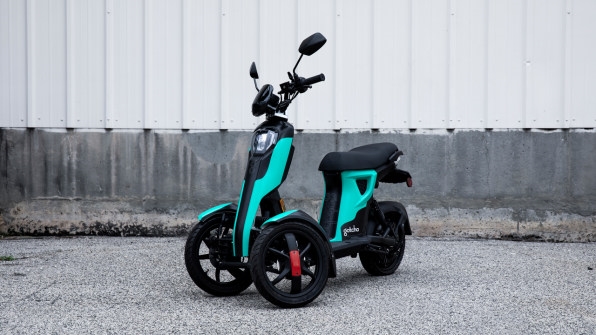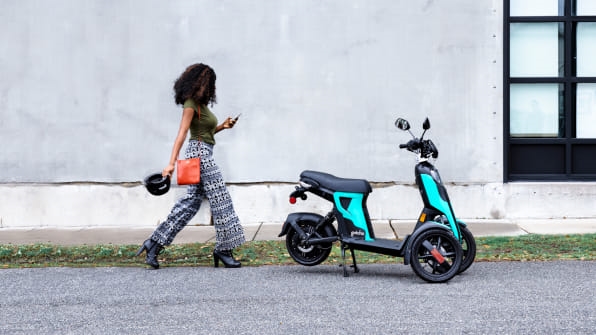Different people gravitate to different types of vehicles, from pickup trucks to SUVs and compacts. So if you want to get them to give up their car, why would you offer just one type of alternative transportation?
That’s the elevator pitch behind Gotcha, an electric mobility as a service company, whose app debuted in December 2018. Much like other bike-share programs, the app shows users virtual hubs and allows them to check out inventory at different docking spots. The difference is that Gotcha offers three options: e-bikes, e-scooters, and an electric ride-share service driven by professional drivers who charge a standard rate (generally $3) to travel within a fixed area. Participating cities include Auburn and Atlanta in Georgia, Lafayette in Louisiana, and San Diego, among others.

At the South By Southwest Festival in Austin this week, the company announced it’s adding a fourth mode: the first publicly sharable electric trike. It’s a five-foot-long teal and black contraption with two wheels up front and one in the back. The e-trike seats two and can hit speeds of up to 25 miles per hour. It weighs a little over 160 pounds and lasts about 40 miles per charge. On a recent test ride, I found it to be downright zippy and fun to drive.
“How do you decrease single-passenger cars on the road and get people like you and me out of our vehicles and onto shared devices?” asks Gotcha founder and CEO Sean Flood. “We decided the only way to do that was to provide enough types of products so that everybody would want them, have a really great app, and make it convenient.” The goal, he says, isn’t just to substitute congestion and carbon-spewing driving but eventually replace it by becoming an “end-to-end e-mobility provider.”

This is the first e-trike to hit the mobility-as-a-service industry. For those uncomfortable jockeying with cars on a bike or scooter, it’s got bright running lights, brake lights and turn signals, plus a chipper Herbie-like horn. “This to me just feels like the right evolution that I could use it to be my daily commuter,” says Flood, who has to cross a very bike unfriendly bridge to get to the company’s headquarters in Charleston, South Carolina.
To prove that—and then some–Flood recently performed the ultimate road test, driving the e-trike nearly 1,000 miles from the company’s first partner city of Tallahassee, Florida all the way to Austin. (The batteries can be swapped out for recharged ones.) Gotcha filmed the seven-day voyage to create Trike Trek, a short documentary that debuted alongside their expansion announcement at South By Southwest.
All of this is new terrain for the company, which started nearly a decade ago when Flood convinced his alma matter Florida State University to authorize a fleet of student-driven electric shuttles on campus. His initial goal was to curb drunk driving, so the rides were free and supported largely by on-vehicle advertising. As the app-based market for finding or hailing rides evolved, Gotcha expanded into other modes like bike-share, but just ran the back-end: Colleges, for instance, have their own branded bikes running on Gotcha’s system.
The decision to become consumer-facing and furnish its own choose-your-own-adventure-style fleet coincided with the realization that while many mobility companies are fighting it out in major cities, Gotcha has a chance to win on college campuses and midsize metros. The company currently has 65 such contracts around the U.S. and is betting that the car-free shift will continue to move into less dense areas. Customers typically pay by the trip. It’s $1 to unlock an e-scooter, $2 for an e-bike, and $4 for the first 15 minutes on an e-trike, plus between 10 and 20 cents per minute after that, depending on your method of travel. This summer, Gotcha will release a monthly subscription model that costs $79 per month for daily access to all four travel options.
“Instead of thinking of ourselves as an advertising company that happened to move people, we [realized] we have a real opportunity to be a mobility company that really moves people with great technology and products,” Flood says. Gotcha earned about $3 million in revenue last year, projects to do at least $15 million in 2019, and should more than triple that in 2020, according to Flood.
The e-trike will roll out in most markets this spring. On my own road test in downtown Charleston, it handled smoothly on several busy, narrow-lane roads, even plowing over the rutted sections like a champ. When regular cars zipped past, they seemed to respect my mechanical bulk, especially when I goosed the throttle to match their speed. At one point, Flood pulled up alongside me on one of the company’s e-scooters, and noticed I was smiling. “The more you enjoy it, the more likely you are to do it,” he told me. That’s why there are options.
Fast Company , Read Full Story
(40)